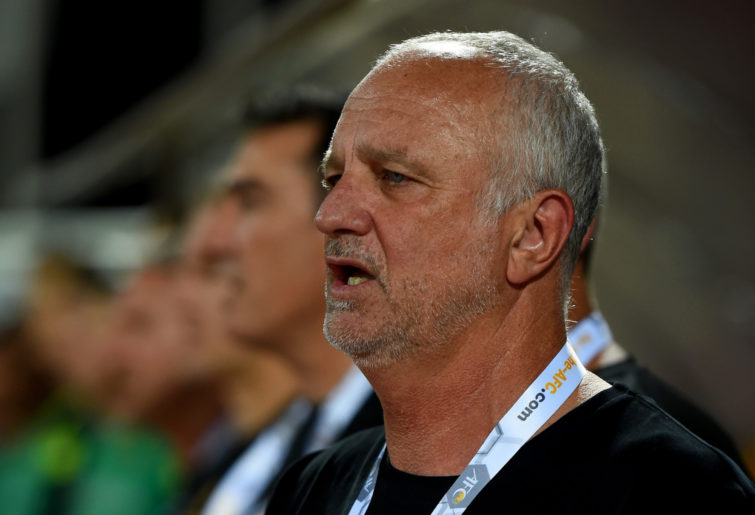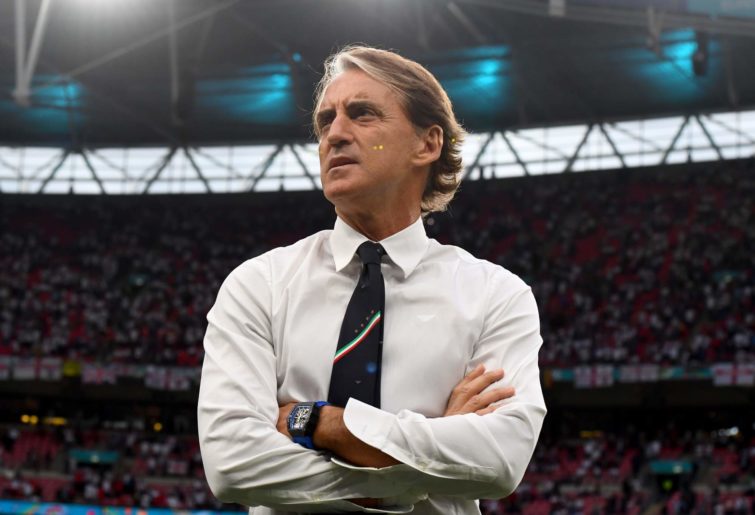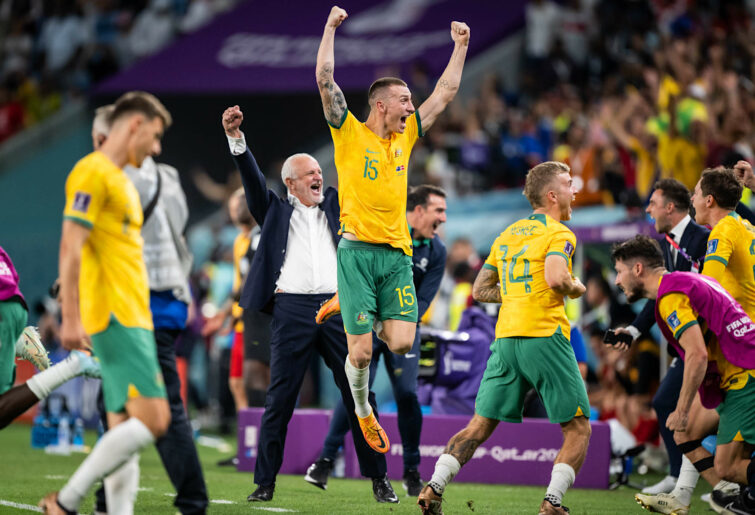After Spain lost to Morocco on penalties at the 2022 FIFA World Cup, a saddened Luis Enrique admitted his guilt in Spain’s failure to overcome their North African neighbour and immediately resigned after the shock defeat. The Royal Spanish Football Federation (RFEF) quickly responded by thanking Enrique for his service.
Meanwhile, after just the first two matches of the UEFA Euro 2024 qualification, Roberto Mancini, the winner of the European Championship, abruptly resigned from the job, after being offered a lavish sum of money by Saudi Arabia. At this point, his Italy had only won three points, a 2-0 win over their neighbour Malta away, having just lost the opener in Naples to England 2-1.
These stories may sound unrelated to that of Graham Arnold, but in the context of Graham Arnold stepping down as coach of the Socceroos, they offer some vital lessons. Mentioning these managers may help provide a context of what should be done for Australia, in particular after the Socceroos’ disastrous September performances – only earning one solitary point in two crucial matches against Bahrain and Indonesia.

Graham Arnold. (Photo by Tom Dulat/Getty Images)
Luis Enrique
Luis Enrique was appointed as coach of Spain to replace the interim manager, Fernando Hierro, following Spain’s catastrophic 2018 World Cup display in Russia. Renowned for his time in Barcelona – winning the Champions League, UEFA Super Cup, three consecutive Copa del Rey titles and two La Liga titles – Luis Enrique naturally generated the strongest support from the Spanish public. Even when he temporarily left the post in June 2019 to care for his ailing daughter Xana, he was still a respected figure and everyone was on his side in his darkest time.
Enrique was determined with his change. Breaking away from the past, he tried to revitalise the Spanish national team by injecting new players like Unai Simón, Aymeric Laporte, Pau Torres, Fabián Ruiz, Pedri, Mikel Oyarzabal and Dani Olmo. While his choices were not without controversy, Enrique’s dedication for change proved warranted; in Euro 2020, the new, young Spanish side would advance to the semi-finals in style, and even came agonisingly close to eliminating Italy in a game where Spain dominated possession and shots. Seeing how positive these changes were, Enrique would stay on as Spain reached new heights: their first UEFA Nations League final, losing to France in a bitter encounter in 2021.
A new era of the UEFA Champions League is here, only on Stan Sport.
But the World Cup in Qatar would not go as expected for Enrique. After thumping Costa Rica 7-0, Spain then failed to win against Germany, Japan and Morocco; the two latter results were devastating for Enrique’s side. Against Japan, despite Spain’s total domination, the Japanese side staged their comeback to shock Enrique’s men with a 2-1 defeat; then Spain failed to break Morocco’s defence before falling 3-0 on penalties. Realising that he’d reached his limit, Luis Enrique permanently stepped down from the position.
Under Enrique, Spain had a new energy. While they fell short from winning anything, Spain were cohesive, organised and determined, with the team always fighting to their fullest strength. Enrique’s ability to spot young talent enabled them to outperform expectation. However, his overreliance on possession football, a tradition of tiki-taka, ended up becoming his own undoing when other opponents understood what kind of tactics Enrique sought to implement and developed alternative plans to neutralise it.
Roberto Mancini
Mancini was hired as coach of Italy when the country suffered its biggest failure at the time: not qualifying for the 2018 FIFA World Cup in Russia. Mancini was given an extremely tough task, to rebuild the Azzurri – already tattered by their shock failure. Mancini, like Enrique, had a prestigious record as coach, being the winner of the Premier League, FA Cup and Community Shield with Manchester City as the club rose to prominence under the Italian.
Like Enrique, Mancini sought to implement changes. He introduced Gianluigi Donnarumma as the new goalkeeper, while also included fresh blood like Emerson, Federico Chiesa, Nicolò Barella and Manuel Locatelli into the squad. His changes proved to be significant as Italy finished their Euro 2020 qualification with a perfect record, before going on to win the tournament after an emotional final against the English hosts in Wembley. With this win, fans started to see Mancini’s team in a new light and expected them to show progress, which they initially did by winning third place in the Nations League, beating Belgium.

Roberto Mancini (Photo by Claudio Villa/Getty Images)
However, things imploded very quickly in the final months of the 2022 World Cup qualification. Italy started to flop in important fixtures against Bulgaria, Switzerland and Northern Ireland, with the latter holding the Italians to a shock goalless draw in Belfast, sending Italy to the playoffs as Switzerland leapfrogged them to appear in Qatar instead. This foreshadowed the eventual catastrophe Italy would face, a playoff fixture against North Macedonia. Had they won this game in March, they would have faced Portugal. That was a moot point, however, as their home encounter against North Macedonia ended in a catastrophic loss, where Italy, despite overwhelmingly dominating the game and taking more than 30 shots against their Balkan opponents, failed to even score. For the first time ever, Italy had failed to qualify for two consecutive FIFA World Cups.
However, to the surprise of the public, Mancini would stay on, instead of leaving for good. This situation would not change until Saudi Arabia came and offered him a prestigious job for the Saudi national team which saw Mancini finally depart. The reason was the Saudis wanted a manager who had a vision and capability to encourage youngsters to shine, something Saudi Arabia have historically done poorly.
Win a Ziggy BBQ for Grand Final day, thanks to Barbeques Galore! Enter Here.
Chivalrous vs Caesar
Undisputably, Luis Enrique was not as successful as Roberto Mancini in international football. However, the biggest difference between Luis Enrique and Roberto Mancini was their behaviour. And that behaviour alone altered their futures.
Luis Enrique was a humble coach, who understood and admitted his faults. He also emphasised the idea of teamwork ethics over individual talents. Luis Enrique, for all of his shortcomings, cared deeply about the players, and also tried his best to improve the players’ morale. His selflessness, despite his stoic appearance on the field, meant that players would always find an emotional supporter on the bench when they were in trouble, a key reason behind Barcelona’s victory in the 2015 Champions League final and Spain’s revival. This was even more noticeable in the 2022 World Cup when Spain exited in the last sixteen; Enrique took the whole responsibility and resigned from the job, instead of blaming the players.
This chivalrous decision of Enrique was not just brave, but it was done in good conscience. The Spanish federation quickly showed their solidarity and respect for Enrique’s decision, and adjusted to it by appointing the then-U21s Spain coach, Luis de la Fuente, in his place. De la Fuente quickly created a new Spain team from Enrique’s leftover works, laying ground for a new, successful era with Spain winning the Nations League in 2022-23 and the Euro 2024.
Roberto Mancini, meanwhile, was more of a dictatorial manager. Despite his obvious talents, notably with the Euros success, his authoritarian approach had long proven to be deeply problematic for teams under his management. This was seen with the flop of Manchester City in the 2012-13 EPL season, when Man City enabled rivals Man United to take the title 11 points ahead and leading to Mancini’s sacking. This would again be repeated with Italy, albeit at a greater and more calamitous scale, when the European champions went from lifting a trophy at Wembley to suffering the ultimate humiliation of a home loss to North Macedonia.
Worst of all, Mancini didn’t have the guts to step down when Italy didn’t qualify for the second consecutive World Cup. Instead, he sought to deflect responsibility for Italy’s failure and insisted that he remain the right man for the job. The Italian Football Federation (FIGC), unlike their Spanish counterpart, also actively shielded Roberto Mancini. This complicity set the stage for the eventual Italian collapse at the Euro 2024, when Italy, under his successor Luciano Spalletti, produced a disjointed performance before losing to Switzerland in a competitive run, erasing any Italian achievement back to zero.

(Photo by Marvin Ibo Guengoer – GES Sportfoto/Getty Images)
Conclusion: why is this important for Graham Arnold and the Socceroos?
James Johnson’s earlier decision to support Graham Arnold could’ve resulted in a similar situation mirroring Italy’s collapse under Roberto Mancini. Luckily, Arnold had decided that he should not follow the Mancini blueprint, and behave more like Luis Enrique, by resigning permanently from the position.
This also provides a clear lesson for Football Australia. If Australia want to make a greater impact, it must look forward. Under Graham Arnold, the Socceroos had produced a series of underwhelming performances, and only by the virtue of immense luck they earned, had Australia outperformed expectation. But luck doesn’t arrive twice, and that’s something Football Australia had failed to understand in the first place.
Had James Johnson succeeded in convincing Graham Arnold to stay on, Australia could have faced a catastrophic outcome for their struggling 2026 FIFA World Cup qualification in a similar fashion Italy endured with their 2022 World Cup qualifying. It’s better to let Arnold go so important changes, no matter how painful, can be instituted, as seen with Spain under Luis de la Fuente.
Australia have only just recently regained some of the prestige of the golden generation with their 2022 World Cup display. But every party must have an end. The lesson is Australia must not simply reform the whole football system at home, but they also need to appoint a coach who can understand the landscape of the beautiful game in Asia.
Only by then can Australia really mitigate the disaster they suffered in September. That also means Australia should look to the way Spain fixed their issues out in the open, not try to conceal them like Italy.
